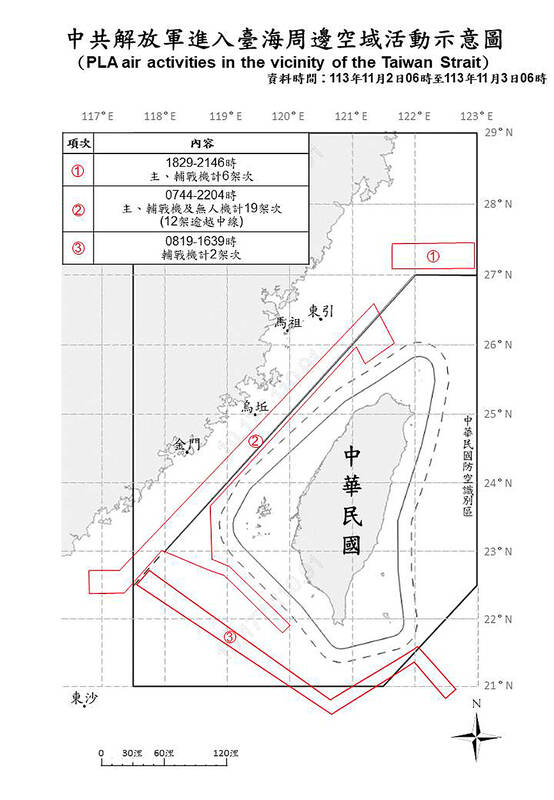The Ministry of National Defense (MND) yesterday said it spotted 35 Chinese military aircraft, including fighters and bombers, flying to the south of Taiwan proper on the way to exercises in the Pacific, a second consecutive day it has reported such activities.
The Chinese Ministry of National Defense did not respond to a request for comment on the missions, reported just days before tomorrow’s US presidential election.
The US is bound by law to provide Taiwan with the means to defend itself. Its arms sales to Taipei include a US$2 billion missile system announced last month.

Photo courtesy of the Ministry of National Defense
The MND said that from 9am yesterday, it had detected 37 Chinese military aircraft, including J-16 fighters, nuclear-capable H-6 bombers and drones.
Of those, 35 flew to Taiwan’s southwest, south and southeast into the western Pacific to carry out long-range training, the ministry said, adding that it had dispatched its own forces to keep watch.
On Saturday, the ministry said China had carried out another “joint combat readiness patrol” with warships and aircraft near Taiwan.
In related news, a source yesterday said that the first sets of M142 High Mobility Artillery Rocket Systems (HIMARS) purchased from the US in 2020 and 2022 arrived in Taiwan last month ahead of schedule.
The military purchased 29 sets of HIMARS in two procurements, with the first 11 sets originally scheduled to arrive between the end of this year and the beginning of next year, and the remainder in 2026.
The 58th Artillery Command of the 10th Army Corps stationed in central Taiwan is training with the platforms, the source said.
Taiwan had originally sought to purchase M109A6 howitzer artillery weapons from the US, but later worked out a deal to purchase HIMARS after the howitzers became unavailable.
Along with the HIMARS, the procurement included 84 MGM-140 Army Tactical Missile Systems (ATACMS), 864 precision rockets, two sets of training simulators and other ancillary equipment.
The HIMARS are to be operated by the army, while the air force’s Air Defense and Missile Command would continue to operate domestically produced Hsiung Feng (“Brave Wind,” 雄風) missile systems. The ATACMS would be deployed based on assessments by the General Staff Headquarters units.
During an interview Su Tzu-yun (蘇紫雲), a research fellow at the state-run Institute for National Defense and Security Research, said that Taiwan would use two types of munitions with the HIMARS: a traditional rocket with a range of 50km to 70km and ATACMS missiles with a range of 300km.
The military could possibly acquire Precision Strike Missiles with a range of nearly 500km, he said.
The sale of the 300km-range missiles to Taiwan signaled mutual trust between Taipei and Washington, which would facilitate future procurements, he said.

AGING: As of last month, people aged 65 or older accounted for 20.06 percent of the total population and the number of couples who got married fell by 18,685 from 2024 Taiwan has surpassed South Korea as the country least willing to have children, with an annual crude birthrate of 4.62 per 1,000 people, Ministry of the Interior data showed yesterday. The nation was previously ranked the second-lowest country in terms of total fertility rate, or the average number of children a woman has in her lifetime. However, South Korea’s fertility rate began to recover from 2023, with total fertility rate rising from 0.72 and estimated to reach 0.82 to 0.85 by last year, and the crude birthrate projected at 6.7 per 1,000 people. Japan’s crude birthrate was projected to fall below six,

US President Donald Trump in an interview with the New York Times published on Thursday said that “it’s up to” Chinese President Xi Jinping (習近平) what China does on Taiwan, but that he would be “very unhappy” with a change in the “status quo.” “He [Xi] considers it to be a part of China, and that’s up to him what he’s going to be doing, but I’ve expressed to him that I would be very unhappy if he did that, and I don’t think he’ll do that. I hope he doesn’t do that,” Trump said. Trump made the comments in the context

SELF-DEFENSE: Tokyo has accelerated its spending goal and its defense minister said the nation needs to discuss whether it should develop nuclear-powered submarines China is ramping up objections to what it sees as Japan’s desire to acquire nuclear weapons, despite Tokyo’s longstanding renunciation of such arms, deepening another fissure in the two neighbors’ increasingly tense ties. In what appears to be a concerted effort, China’s foreign and defense ministries issued statements on Thursday condemning alleged remilitarism efforts by Tokyo. The remarks came as two of the country’s top think tanks jointly issued a 29-page report framing actions by “right-wing forces” in Japan as posing a “serious threat” to world peace. While that report did not define “right-wing forces,” the Chinese Ministry of Foreign Affairs was

PREPAREDNESS: Given the difficulty of importing ammunition during wartime, the Ministry of National Defense said it would prioritize ‘coproduction’ partnerships A newly formed unit of the Marine Corps tasked with land-based security operations has recently replaced its aging, domestically produced rifles with more advanced, US-made M4A1 rifles, a source said yesterday. The unnamed source familiar with the matter said the First Security Battalion of the Marine Corps’ Air Defense and Base Guard Group has replaced its older T65K2 rifles, which have been in service since the late 1980s, with the newly received M4A1s. The source did not say exactly when the upgrade took place or how many M4A1s were issued to the battalion. The confirmation came after Chinese-language media reported